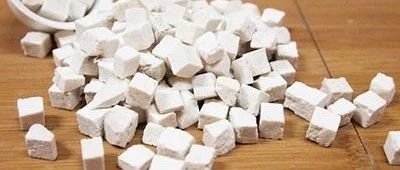This official account is managed by the National Administration of Traditional Chinese Medicine. If you have not followed us yet, please click the blue “Chinese Medicine” above to follow.
Source: China Traditional Chinese Medicine News
Authors: Xu Xin, Wu Xiaohong, Shanxi University of Traditional Chinese Medicine Affiliated Hospital
In the 60th chapter of “Dream of the Red Chamber,” it is written: “Jasmine powder replaces rose nitrate, rose dew brings Poria cream.” Qian Huai’s sister-in-law handed a paper bag to the Liu family, saying, “Yesterday, an official from Guangdong came to visit and brought two small baskets of Poria cream… I opened it and found it very beautiful, snow-white. They said it was mixed with human milk and eaten every morning for nourishment. If there is no human milk, cow’s milk can be used, or at least boiled white water will do.” This “snow-white” substance is Poria cream, also known as Poria syrup, a type of traditional Chinese medicine paste.
Poria (Fu Ling) grows on the roots of pine trees, and those that attach to the pine roots are called Poria, mainly produced in Hubei, Anhui, Guizhou, and Sichuan provinces in China, with the best quality coming from Yunnan, known as Yun Ling. Traditional Chinese Medicine (TCM) considers Poria to have a sweet, bland, and neutral nature, entering the heart, lung, spleen, and kidney meridians. It has the effects of strengthening the spleen and benefiting qi, promoting urination and reducing swelling, calming the mind, and soothing the spirit. According to “Pharmaceutical Chemical Meaning,” it states that its “taste is uniquely sweet and bland; sweetness can nourish, blandness can drain, and sweetness and blandness belong to the earth, which can nourish the spleen yin, and the earth is strong and generates metal, also benefiting lung qi.” In ancient times, Poria was often used in the palace to prepare medicinal pastes as health products. Modern research shows that Poria has inhibitory effects on various bacteria; it can reduce gastric acid and has preventive effects on gastrointestinal ulcers; it has significant protective effects against liver damage; and it also has anti-tumor effects, regulating immune function in multiple ways. Clinically, TCM believes that Poria has a neutral nature, which can both strengthen the body and expel pathogens. Those who are ill can take it to expel disease, while those who are healthy can take it to strengthen their bodies.
There are many ways to prepare Poria syrup; here are two recommended methods for you to try.
Poria Milk Syrup
Break the white Poria into small pieces and soak in water for 2 hours; then place the soaked Poria in a steamer and steam for 40 minutes. After steaming, put it into a blender, add milk, blend until smooth, and boil over high heat. Add honey to taste when eating.
Poria Honey Syrup
Take 500 grams of Poria and 1000 grams of refined honey, grind the Poria into a fine powder, mix it evenly with honey, and simmer over low heat until it becomes a paste. Store it in a porcelain jar for later use, taking one small spoon each time.
It is important to note that while Poria is beneficial, it should not be consumed in excess. Also, avoid consuming Poria with rice vinegar, strong tea, etc., as it may affect its medicinal effects; Poria has diuretic properties, and those with kidney deficiency may sometimes experience frequent urination or urgency, and taking Poria may exacerbate these symptoms, affecting sleep.
Edited by: Wang Di
China Traditional Chinese Medicine
WeChat ID: satcm01


